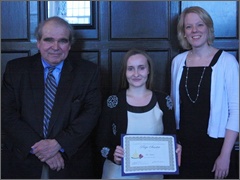
Earlier this month I attended the Vita Institute at the University of Notre Dame. The two-week event was an amazing opportunity for total immersion into the pro-life cause from a range of disciplines—and provided some very valuable insights that I think you may find helpful.
Twenty-two other eager students and I, who serve in a slew of capacities—from directors of pregnancy care centers, to political think-tank leaders, to avid pro-life laymen—all descended on the lovely Notre Dame campus to learn from the best and brightest in their fields. We students were a diverse bunch of five men and eighteen women, including a woman from Tanzania and another from Mexico.
Our many different backgrounds, senses of humor, and quirky personalities and made us a motley crew, yet Vita proved to be a very unifying experience, knowing that by pro-choice standards some of my fellow students would have been considered prime candidates for abortion because of detectable disabilities, being born into poverty, or prenatal health issues.
At Vita, we were given the privilege to a learn of the history and landscape of the pro-life cause through bioethics, philosophy, theology, political and social science, and law, as well as some outreach exposure at a home for pregnant mothers and a pregnancy care center. We covered the gamut of life issues, exploring the spectrum from the impact of embryonic stem cell research to the rise of contraception, abortion to infanticide, euthanasia to brain death.
We were also blessed to have the Pro-Life Action League’s founder and national director Joe Scheidler (accompanied by his wife Ann) give a rousing talk at the event, telling about the early days of the pro-life activist movement.
Some Relevant Pro-Life Talking Points I Learned at Vita
Fertilization is an event, not a process – and takes 1/5 of a second to happen. The father of a newly conceived baby is already carrying out his role of provider—through his sperm, the father’s genome is actually in every cell of the placenta helping to feed and sustain his baby. Yet, sadly, our laws give a father no legal rights to stand up for his child—who also shares his DNA—against the woman if she wants an abortion for any reason.
Science, as confirmed by cell biologists, shows that life begins at conception. Yet many politicians assert that we “really don’t know when life begins,” that it’s a debatable, ambiguous question. Yet, the coordinated acts of an organism (in this case an embryo) being created by a process which is self-propelled from the earliest stages on, is hard to deny, even though many people set up arbitrary points for when life begins according to a widely varied measuring stick.
Embryonic stem cells (ESCs) haven’t been proven to cure a single sick person, yet a lot of unrealistic hope is given to its potential by the secular media—even the appeal to emotion of curing Christopher Reeve of his paraplegia.
Embryonic stem cell research (ESCR) brings with it the ethical dilemma of using already created human embryos for scientific experimentation from in-vitro labs (which poses another question of cooperating with evil even if it’s for a seemingly good end). Of course, the moral relativists reason, “These little embryos are already made and will just go to waste, so why not use them for the good cause of scientific experimentation and maybe find cures?” Yet doing so is directly participating in an immoral act because it’s destroying a human embryo regardless.
Besides the moral dynamics, there are a slew of practical issues at play with ESCR: Most notably, ESCs themselves are foreign tissues that are often rejected by the immune system and can lead to tumor growth in patients. By contrast, adult stem cell research has proven effective in medical treatments and is guaranteed to be accepted by a patient’s body as a proper match.
From a philosophical perspective, we explored in varying degrees of depth the impact of cooperation in evil, be it through ESCR (and destroying embryos), abortion, or any other assault to life in all its stages.
As for the PR side of pro-life, our side hasn’t admittedly made a compelling enough case for “adoption” as a way of “answering” abortion. Adoption is not a simple answer but there are many ways our side have made it a more attractive option to women in unplanned pregnancies. The stigma comes from how the pro-choice side paints adoption as the ultimate abandonment or neglect—“I could never give my baby away”—and how it makes the women feel irresponsible.
Meanwhile, pregnancy care centers often only play up the option of keeping the baby and entirely avoid talking about adoption because of the stigma it carries as they don’t want to risk losing the woman to abortion. So the pro-life side should play up adoption as an “empowering” option for women—where she has the most control over what becomes of her baby and how she can give her child a better life—to be most effective in saving lives and bringing hope.
In law, abortion has been engraved as a fundamental “right to privacy” “between a woman and her doctor.” Ironically, in the legal documents surrounding it, the “burdens” listed deal with unwanted parenthood and not with unwanted pregnancy, which prompts the question, “Why not make adoption more accessible to avoid unwanted parenting?”
Meanwhile, “health of the mother” is often cited as the reason for getting an abortion. Yet Roe v. Wade actually gives the abortionist unfettered power to diagnose the woman’s health, while he is the one who stands to gain financially. So, it sets up a paternalistic, highly corruptible system which has led to the abortion of 50 million American babies since 1973.
These are just some tidbits I gleaned that seemed especially relevant to the life issues that may fuel some lively debates with the other side. I would encourage you to consider applying to the all-expenses paid Vita Institute in the summer 2013 to broaden and strengthen your pro-life knowledge.
